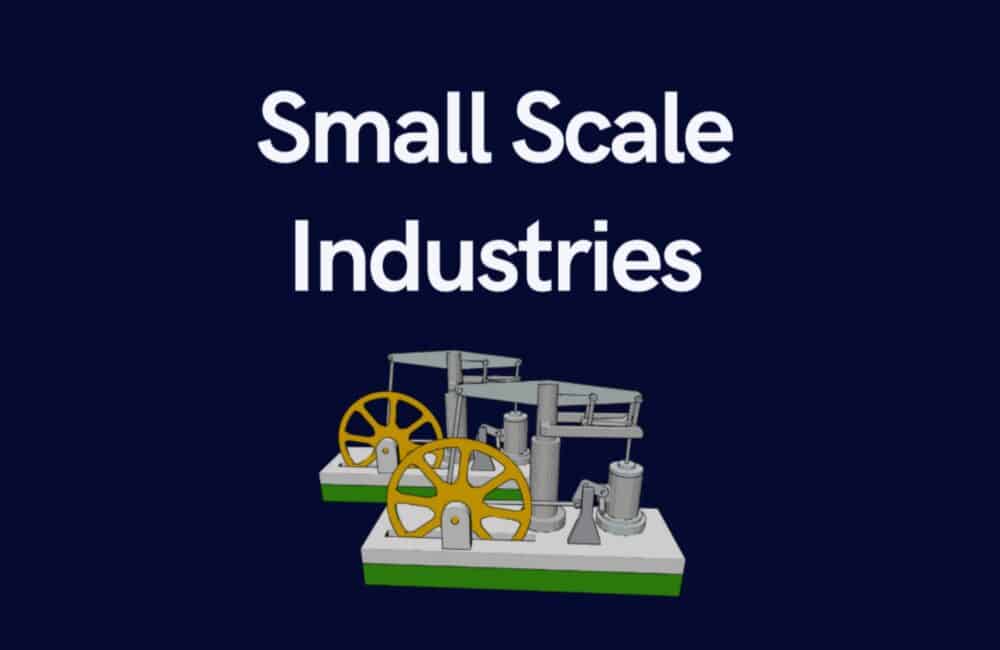The modern world has everything from clothes, ready-to-eat food, smartphones to cars, modern medicines, and concrete to fulfil all the needs of living beings. One must ponder from where do all these goods come from? Earlier in the 17th Century, the world was yet to discover something that would completely revolutionize the lives of the people.
People in the 17th Century lived in the agrarian economy whereby foodgrains came from agricultural fields, clothes came from cloth mills handwoven by the people and smartphones were non-existent. But then the 18th Century rolled by bringing about the Industrial Revolution which introduced the modern-day machines that could manufacture and produce goods at a much faster pace.
So, getting back to our earlier question, where do all these goods come from? They come from the Industries. Although the industries have upgraded themselves from the Industrial Revolution phase, today most of the goods are manufactured in the industries.
Take for example the transition from horse carriages to automobiles. Back in the day people rode their carriages to travel between cities or different states. Due to the Industrial Revolution, cars were manufactured which not only helps you travel at a much faster pace but also has modern-day tech such as air conditioners or stereos entertain you while you travel in comfort.
The manufacturing of goods in industries has changed our lives in more ways than we can imagine. The industries are however divided into two different branches: Small Scale Industries and Large Scale Industries. Many people are very familiar with Large Scale Industries due to the variety of goods that they produce on a larger scale. But Small Scale Industries have also become a formidable fragment of the industries. Let us take a look at the Small Scale Industries in more detail.
What Are Small Scale Industries?
Ajay goes to a tiny bakery shop beside his college every day to buy his favourite cakes. Reema often visits a small beauty salon at the corner of the street. Raj is crazy about pickles and runs to Shyam’s uncle’s shop to buy them every month. But what do Ajay, Reema, and Raj have in common? The things they are buying are barely related to each other or are they? Bakery, beauty salons, or even pickles sold at some general store all belong to the same category — Small Scale Industries. But what does the term Small Scale Industries mean?
Small Scale Industries are those industries that carry out the process of manufacturing, services, or production on a micro-scale. In simple terms, you will be processing the goods with the help of a small portion of people and machines.
Small Scale Industries make a minor investment not exceeding Rs. 10 Crores in machinery, plant, or equipment and the annual turnover should not exceed Rs. 50 Crores. Emerging markets such as India thrive on Small Industries that help in boosting the economy.
According to the Confederation of Indian Industry, Small Scale Industries contribute approximately 6.11% of the manufacturing GDP and 24.63% of the GDP from the services industry. Not only this but Small Scale Industries are also known for employing over 120 million people consisting of a significant rural workforce and contributing to 45% of the overall exports of India. In other words, Small Scale Industries is one of the most manufacturing segments that help in boosting the growth of the economy.
Recommended: Large Scale Industries
Types Of Small Scale Industries
Small Scale Industries are divided into three different sub-categories:
1. Manufacturing Industries
The small units of a particular industry are known for manufacturing raw material or finished goods that can be used by other processing industries or for consumption purposes respectively. Such industries are usually owned by individuals due to their smaller size. For example, the papad-making business is a small-scale manufacturing business that is usually owned by a particular individual who makes the papad and sells it in the marketplace to earn money.
2. Ancillary Industries
Usually, the large-scale manufacturers in India are known for producing finished goods to sell them in the market. But most of the large-scale manufacturers have to procure the raw material to fulfill the process of the finished goods. Ancillary Industries are known for producing raw material or various parts of the machinery which can be used for the manufacturing of the finished goods. For example, Auto Ancillary companies are known for producing and selling the intermediate parts of an automobile that can be used by the auto industries to manufacture the cars.
3. Services Industries
Services Industries are those that may provide you with after-sale services. This may include maintenance of a product or repairing any damaged goods that may be reusable later. For example, after buying a car and using it for a year you realize that there is some problem with the engine. So you take it to the service center and get it replaced with a new engine.
Other than the most significant classification of industries mentioned above there are other small scale industries such as:
- Cottage Industries — These are small-scale industries that are operated on a decentralized basis through private resources. Such businesses are often created at a home rather than operations carried out via private facilities.
- Export Industries — These are small-scale businesses also known as export units. Usually, a business is only called an export unit if the total exports of the business exceed 50% of its manufacturing process. If you are classified as an export unit, you will also enjoy various government grants and bonuses.
- Village Industries — Industries that are located in rural areas consisting of the rural workforce. Such industries usually belong to the unorganized sectors of the economy.
Examples Of Small Scale Industries
1. Agarbatti Industry
India’s incense industry is one of the largest village industries in the world. According to Khadi & Village Industries Commission (KVIC), India consumes 1,490 tons of agarbatti per day. Recently the Covid-19 has disrupted many businesses in the rural regions and incense was one of those industries. Even though the pandemic caused disruptions, the demand has remained at similar levels. Agarbatti production also recovered by August when the unlock started and since then the market has recovered significantly.
Historically, the incense production has remained at INR 7,000 Crores which is expected to increase shortly to INR 7,500 to INR 8,000 Crores. India is well-known for its incense market and exports its agarbatti to 150 countries which includes the likes of the USA, Nigeria, United Kingdom, and Malaysia. To date, India has employed 4 Lakh people in the incense industry which includes 80% of the women working in this segment. Some of the most famous Agarbatti brands in India consist of Cycle Pure Agarbatti, Moksh Agarbatti, Zed Back Agarbatti, etc.
2. Toy Manufacturing Industry
Toys are one of the well-known domestic industries in India. 90% of the toys market is unorganized consisting of at least 4,000 manufacturers across the country. Most of these toy manufacturers are located in the bigger states such as Maharashtra, Karnataka, New Delhi, Tamil Nadu and spread across the central Indian region in small clusters. The domestic toy market is estimated to grow by approximately 10-15% in the upcoming years.
PM Modi had addressed the nation in February 2021 where he called forward the founders of the start-ups to explore the toy industry. The Government of India has also recently given their approval for the development of 8 toy manufacturing clusters with an expenditure of INR 2,300 Crores. One of the clusters has already been a work in progress in the region of Koppal, Karnataka. Koppal Toy Cluster is being developed together with the partnership of Aequs Infra and it will spread across 400 acres of land. This has the potential to create approximately 40,000 jobs in the next 5 years. Famous toy companies in India include popular names such as Funskool, Fisher-Price, Hot Wheels, etc.
3. Spice Industry
India is one of the world’s largest consumers as well as the exporters of spices with the production of 75 out of the 109 spice varieties produced in the world. The Indian Spice Market is worth approximately INR 75,000 crores and yet it is a largely unorganized industry. Branded businesses make up 15% of the overall spice segment. However, in recent times there is an increased demand for packed ready-made spices that are sold on market shelves. Hence, the demand for unbranded spices has diminished in the urban regions. Rural regions remain popular for their homemade spices.
India is the biggest producer of turmeric, chili, and ginger. Rajasthan is the leading manufacturer of spices while producing over 9,80,000 metric tons in 2019-20. Gujarat comes in second producing over 7,60,500 metric tons followed by Andhra Pradesh which produces over 7,47,450 metric tons. Top brands in the spices industry include the most famous players such as Everest, MDH, Badshah, Catch, etc.
Small Scale Business Ideas
Small-scale business is a business that is usually home based. It may employ just a few people, or it might be just an individual who is self-employed. It is sometimes called a micro-business. Such a business can usually be run successfully on a part-time basis, and many people supplement their income by running such a business.
- Bakery
- Electric Charging Point
- E-commerce Seller
- Handmade artifacts
- Fashion Tailor
- Shop
- Cafe
- Book seller
- Coaching Class
- Affiliate Marketing
- Real Estate Agent
Advantages & Disadvantages Small Scale Industries
| Advantages of A Small Scale Industry | Disadvantages of A Small Scale Industry |
| Small Capital Requirement | Higher Costs |
| Simple Management | Difficulty to Acquire Credit |
| Direct Customer Relations | Poor Quality of Goods |
| Independent Operations | Pressure from Competition |
| Demand based Production | Lesser Use of Machinery |
Advantages Of Small Scale Industries
- Small Capital Requirement
Small Scale Industries are known for running their business based on micro capital needs. The biggest advantage about the SSI is that you can start your own business based on a small capital before progressing towards large-scale production. Many businesses face the hurdle of commencing the business due to lower funds which may not be a severe problem when it comes to small businesses.
- Simple Management
Any of the large industries always face the one problem which ultimately leads to their downfall, the management of their resources. Small businesses on the other hand can easily manage their resources as owners have direct relations with the employees. The chances of miscommunication are slim and owners can easily solve the grievances of their employees through direct communication.
- Direct Customer Relations
Wouldn’t it be nice if a customer could easily solve their problem with help from the business owner? That is exactly what small-scale businesses can accomplish by establishing a direct relation and communication link with their customers that can help in solving consumer grievances in a much faster way.
- Independent Operations
Small business organizations offer their owners the freedom to work on their terms without having to answer any of the business subordinates. This sense of independence helps the owners function in a much efficient way and motivate their employees.
- Demand-Based Production
The nature of demand is very small when it comes to small-scale organizations. This results in production on a micro-scale which is very economical and also eliminates the evils of large-scale production.
Disadvantages Of Small Scale Industries
- Higher Costs
Small businesses in India are often at a disadvantage because of the rise in costs of raw materials, production, or labor which most small-scale organizations cannot afford. In addition, the owner also has to incur extra costs based on rent if there is a private facility which leads to an increase in the overall overhead cost.
- Difficulty to Acquire Credit
Small scale organizations have lower capital needs however on days when a business needs some extra money to expand its operations, the owner needs to avail loans. But the credit facility can be quite restricted for such businesses due to business uncertainty.
- Poor Quality of Goods
The goods manufactured by the small businesses are not standardized and may not be up to the mark in terms of quality. Poor quality of goods can cause the firms to lose their loyal set of customers.
- Pressure from Competition
Competition can be fierce especially if your competitor is offering a better product at a lower price to the customers. Plus large organizations often gain brand recognition which enables them to penetrate the market easily. This can be tough for the survival of the smaller organizations that are striving to carve a place in the market.
- Lesser Use of Machinery
Availability of smaller capital enables the owner to buy small machinery which can be operated with human assistance. But modern machines can produce at a much faster pace saving your time and resources to manufacture goods. However, the owners of small organizations cannot afford such costly machines. This can also result in the cost per production remaining higher due to the higher utilization of manual labor.
Summary – Small Scale Industries
| Small Scale Business | Minimum Capital Required (INR) |
| Handmade Candles | 20,000 |
| Pickles | 10,000 |
| Papad | 30,000 |
| Noodles | 40,000 |
| Agarbatti | 50,000 |
| Handmade Chocolates | 50,000 |
| Homemade Bakery Items | 1,00,000 |
| Coconut Oil | 1,00,000 |
| Organic Soap | 1,50,000 |
| Paper Making | 2,00,000 |
| Paper Bag Making | 5,00,000 |
| Furniture Making | 5,00,000 |
Final Thoughts
Small Scale Industries are slowly shifting from unorganized segment to organized segment within different industries. The revenue contribution to GDP from Small Scale Industries has been growing on a consequent basis. Most of the Small Scale Industries are known for employing rural population which is also helping the employment levels whilst helping the Indian Economy to grow and remain strong in the upcoming years.
Frequently Asked Questions
Define The Characteristics Of Small Scale Industries.
Some of the characteristics include: Localized Operations, Labour-intensive, Individual Ownership, Flexibility in Management, etc.
How To Start A Small Scale Business?
First of all conduct a market research, then shortlist the segment of operation, acquire the resources needed to start and then launch the business.
What Kind Of People Are Called ‘Small Scale Manufacturers’?
Small Scale business can be run by anyone such as bakeries, salons, photo studios, etc.
Do I Need To Register My Small Scale Business?
Yes, if you are earning out of it, it is important to register your company with the Government.
Can I Get Funding For My Small Scale Business?
Yes. But first focus on ensuring that your business is running smoothly and there is scope for scaling up. Then, you can approach VCs and other firms that provide investment.




